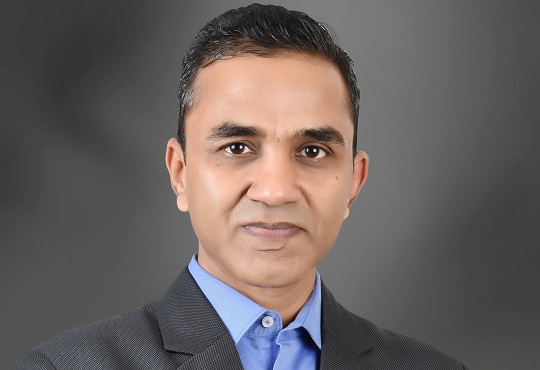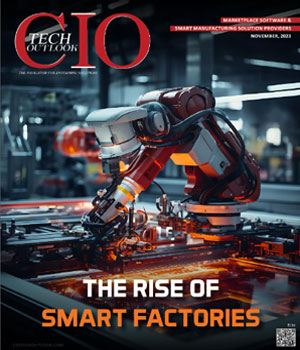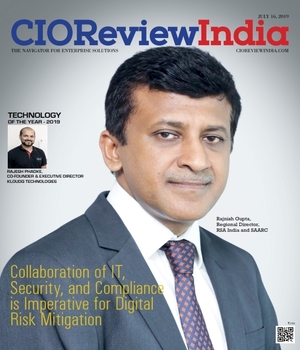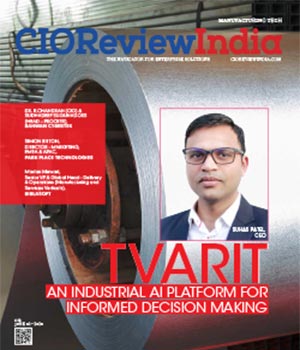Revolutionizing the Electrical Equipment Industry with Smart Manufacturing
Janifha Evangeline

Pramod Mundra, EVP & CIO, Havells India Ltd., in interaction with Sudhakar Singh, Editor, CIOTechOutlook shares his thoughts on how the electrical equipment industry is evolving in India and how Industry 4.0 is transforming the industry.
Industry 4.0 is going to transform manufacturing to make floor operations efficient with less downtime. How do you see the adoption of smart manufacturing in the electrical equipment sector in India?
First of all, I don’t think it is a consideration only for the electrical industry but should rather be for all the players in goods manufacturing.Industry 4.0 helps in making manufacturing operations highly efficient because it allowsintelligent controls, chances of a fewer errors, and real-time monitoring of what is happening on the shop floor.This enables the plant managers to take proactive measures in ensuring machines continue to work seamlessly and quality is achieved.
There are many elements in industry 4.0. and the pillars of it include Industrial IoT (IIoT), Big data& Analytics, Cybersecurity, Edge computing, Augmented Reality, and so on. When an organization embraces Industry 4.0 for its manufacturing operations and when allthesepillars come together, then you see the true transformation taking place. Adoption of the pillars of Industry 4.0 is on the rise in India and organizations understand that it is imperative in order to move forward and remain competitive. Advancements in technology, higher awareness and availability of skills are enabling the adoption.
How is Havells India adopting Industry 4.0?
In December’ 21, we unveiled our Industry 4.0 ready plant in Ghiloth, where we manufacturer Lloyd ACs and Washing machines under the brand - Lloyd. We intend to make all our other plants also compliant with Industry 4.0 in a few quarters' time. We strongly believe that this is the future and we are committing investments for it.
Reports suggest that the majority of manufacturers either have an ongoing smart factory initiative or are working towards one, but more than 80 percent of them are unable to achieve the expected level of success. What according to you is the main reason for this?
Industry 4.0 is more than just technology implementation. It is a classic Change ManagementProgram, which requires a significant amount of collaboration across various functions. Technology is one part of it. Right from people on the shop floor, to the factory supervisory roles, to theproduction planning, to the head office-based roles on quality supply chain, finance, and technology, everyonemust come together to make a program like this successful.
Many a times, organizations are not able to see the benefitsbecause it is either a half-hearted attempt to do something because everybody else is doing it or at times, there are other CAPEX priorities. For instance, you commit to some investments, but in between, you realize that the investments are needed elsewhere. Sometimes lack of a cohesive direction among teams is also a potential reason. It is an organization-wide attempt and any lack of direction or cohesiveness towards a common goal can derail the project.
And lastly, whenever organizations go on theIndustry 4.0 journey, they should try and accomplish it end-to-end rather than doing it in parts. A comprehensive approach ensures that all the components of Industry 4.0 work in a synchronous manner and yield the desired results.
Real-time monitoring of each machine on the shop floor through the Internet of Things (IoT)-based sensors isincreasingly becoming a norm. How can this process be improved to bring accuracy to predictive maintenance?
The sensors are a very important part of Industry 4.0 landscape. While all the programs such as Big Data and Analytics, AR, Cybersecurity, etc work in the background, a sensor is key as it captures data from machine, which is probably the first data point that gets captured in the manufacturing process.
Therefore, having the relevant sensors is critical. There are sensors, which can measure machine temperature, vibration intensity, cycle time etc and transmit the data to cloud. By using the right edge computing solutions that can help process the data almost instantly, manufacturers can makeproactive decisions towards machine maintenance. Additionally, using predictive analytics via AI/ ML on the sensor data can be another method that can help determine machine maintenance needs.
Where do you see the electrical equipment manufacturing industry in the near future in terms of new technology adoption? Which new technologies do you foresee being implemented?
Today's consumers do their research themselves and are very clear on the choices that they make related to their lifestyle, products & services they want to procure and brands they want to associate with. At Havells, weare always listening to our consumers and our goal is to ensure we offer the best products and services to them.
As far as technology adoption is concerned, I believe Cloud, Digital twin, Cognitive analytics, Industry 4.0 and a relevant SaaS will be critical for the success of the organization. Additionally, we will see lot more democratization of home automation and IoT-based products.
I feel technology, especially in our industry, must change its rolefrom an enabler to a driver. The pandemic hasaccelerated technology adoption and has shown the world importance of technology. At Havells, our technology and R&D investments are probably the highest in the industry and, we take pride in how we use technology to enable our employees, trade partners and consumers. We are at a point where there will always be pressure to demonstrate value for the investments. So, my belief is that CIOs need to focus a lot on meaningful innovation and business value creation.
CIO Viewpoint
Empowering Women: Shaping the Future of Industry
By CIOTechOutlook Team
Scaling AI: Finding the right Biztech...
By Sujatha Gopal, CTO - Communications, Media & Information Services (CMI), Tata Consultancy services
Gen AI: Transforming Cloud Solutions for...
By Matt Yanchyshyn, VP - AWS Marketplace & Partner Services, AWS
CXO Insights
How Manufacturing 4.0 Initiatives Are...
By Raghu Vokuda, Digital Head & Technology Evangelist, JSW Cement
Sustainable Tech: Shaping a Greener Future for...
By Sanoj Somasundaran, CTO – SKF India and Director, Technology Development – SKF ISEA Region
How Smart Manufacturing is Shaping Pharma's Future









